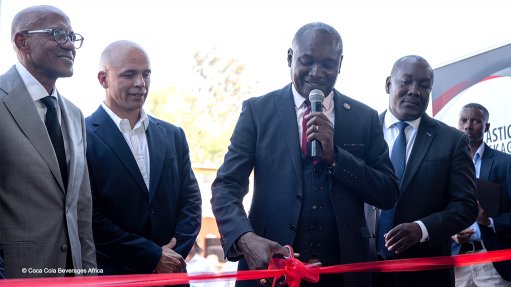Institutions call for more awareness on skills development in the solar sector

EWSETA CFO and acting CEO Mpho Mookapele explains the skills needed for a burgeoning solar power sector
The decommissioning of coal-fired power stations without repurposing of labour will considerably exacerbate the unemployment crisis in South Africa and, therefore, workforce relocation and the associated skills development it calls for, needs to be considered ahead of time.
Energy & Water Sector Education Training Authority CFO and acting CEO Mpho Mookapele stated this during the virtually held Solar Power Africa conference on November 17.
She highlighted that, for example, Mpumalanga, which has the highest concentration of coal-fired power stations in the country, has not started branching out with the qualifications offered at technical vocational education and training colleges and still focus on fossil-fuel-related training opportunities.
As the bid windows for the Renewable Energy Independent Power Producer Procurement Programme progresses, as per the Integrated Resource Plan 2019, which calls for certain amounts of solar photovoltaic (PV) power, besides others, there is an increasingly urgent need for skills in system design, project development, construction, installation, operation and maintenance of solar PV plants.
Each of these fields have a multitude of learning topics and job positions linked to it.
Mookapele said the country needed to ensure it had a capacitated workforce to service the solar PV industry, which particularly lacked mounters, panel cleaners, system designers, installers and maintenance personnel.
The public colleges, of course, also need to come on board in terms of the qualifications they have on offer.
Mookapele noted that only four public colleges in the country − Northlink College, False Bay College, South West Gauteng College and Durban University of Technology − were currently accredited with skills development professionals for renewable energy training.
Meanwhile, the South African Renewable Energy Technology Centre (Saretec) offers a Quality Council For Trades & Occupations-accredited qualification called the Solar Photovoltaic Service Technician occupational certificate.
Saretec project manager Claude Cogill said the purpose of the training that it offered towards this qualification was to develop and prepare a learner to operate as a solar PV technician in the burgeoning renewable energy environment.
A solar PV service technician performs installations and maintenance on PV systems in compliance with industry regulations. The qualification comprises a four-part qualification entailing system mounter, installer, technician and service technician.
The training programme for this qualification is based on theory, practical learning and workplace learning, with each of the areas being independently assessed.
Cogill said the final External Integrated Summative Assessment for the qualification covered all of the learning pathways, almost like a trade test, in a two-day theory and practical overall assessment.
As it stands, he points out that the country lacks specific technical skills in the solar PV environment, while access to market and market advocacy remains limited. The demand is clear though, Cogill states, and development partnerships will have to form between technical colleges, government and industry to make use of opportunities to fill gaps in the market.
“We have the ingredients to meet the skills gaps, we have training capacity through colleges, we have unemployed youth, we have the industry need for more capacity to install and we have the demand to meet Integrated Resource Plan requirements. Let us get started,” he urged.
Comments
Press Office
Announcements
What's On
Subscribe to improve your user experience...
Option 1 (equivalent of R125 a month):
Receive a weekly copy of Creamer Media's Engineering News & Mining Weekly magazine
(print copy for those in South Africa and e-magazine for those outside of South Africa)
Receive daily email newsletters
Access to full search results
Access archive of magazine back copies
Access to Projects in Progress
Access to ONE Research Report of your choice in PDF format
Option 2 (equivalent of R375 a month):
All benefits from Option 1
PLUS
Access to Creamer Media's Research Channel Africa for ALL Research Reports, in PDF format, on various industrial and mining sectors
including Electricity; Water; Energy Transition; Hydrogen; Roads, Rail and Ports; Coal; Gold; Platinum; Battery Metals; etc.
Already a subscriber?
Forgotten your password?
Receive weekly copy of Creamer Media's Engineering News & Mining Weekly magazine (print copy for those in South Africa and e-magazine for those outside of South Africa)
➕
Recieve daily email newsletters
➕
Access to full search results
➕
Access archive of magazine back copies
➕
Access to Projects in Progress
➕
Access to ONE Research Report of your choice in PDF format
RESEARCH CHANNEL AFRICA
R4500 (equivalent of R375 a month)
SUBSCRIBEAll benefits from Option 1
➕
Access to Creamer Media's Research Channel Africa for ALL Research Reports on various industrial and mining sectors, in PDF format, including on:
Electricity
➕
Water
➕
Energy Transition
➕
Hydrogen
➕
Roads, Rail and Ports
➕
Coal
➕
Gold
➕
Platinum
➕
Battery Metals
➕
etc.
Receive all benefits from Option 1 or Option 2 delivered to numerous people at your company
➕
Multiple User names and Passwords for simultaneous log-ins
➕
Intranet integration access to all in your organisation



















